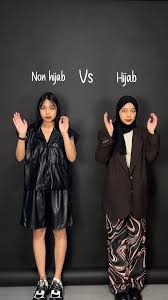By Yasir Aladodo

In Western education, the journey of some hijab-wearing sisters takes an unexpected turn whenever they get admission into universities. Despite parental teachings on modesty, the influence of newfound friends, like Sulykha’s companion Shewa, can lead to a shift in perspective.
Sulykha, hailing from a family where hijab is synonymous with dignity, embarks on her academic journey in a distant state. However, the influence of Shewa exposes her to a world that challenges the values instilled by her parents. Events like the university’s Jambito night become a battleground for Sulykha’s internal struggle between her upbringing and newfound social pressures.
A pivotal moment occurs when Sulykha, initially donning a hijab at an off-campus party, is questioned by a male acquaintance. Shewa’s encouragement to embrace a more carefree lifestyle eventually leads Sulykha to shed her hijab at a cultural event. Sulykha, having removed her hijab, attended the party with Vaen, prompting laughter from her friend who remarked, “You are now talking! I’m not saying you shouldn’t wear a hijab, but be social, don’t dull yourself – you’re a fine girl,” advised Shewa.
After the party, Sulykha found herself invited to Ola’s house that night. Nervous and inexperienced, she hesitated, expressing her concerns to Ola, “Don’t make me follow you to your house. Let’s do everything we want to do and discuss it here; I’m scared.”
She gradually extends her hand to shake with the guy, engages in rough play with him, and participates in activities that are known to be prohibited.
In the complex landscape of Western education, the transformation of hijab-wearing sisters into non-hijab wearers underscores the powerful influence of peer relationships and the need for a balanced approach to personal and cultural identities.
